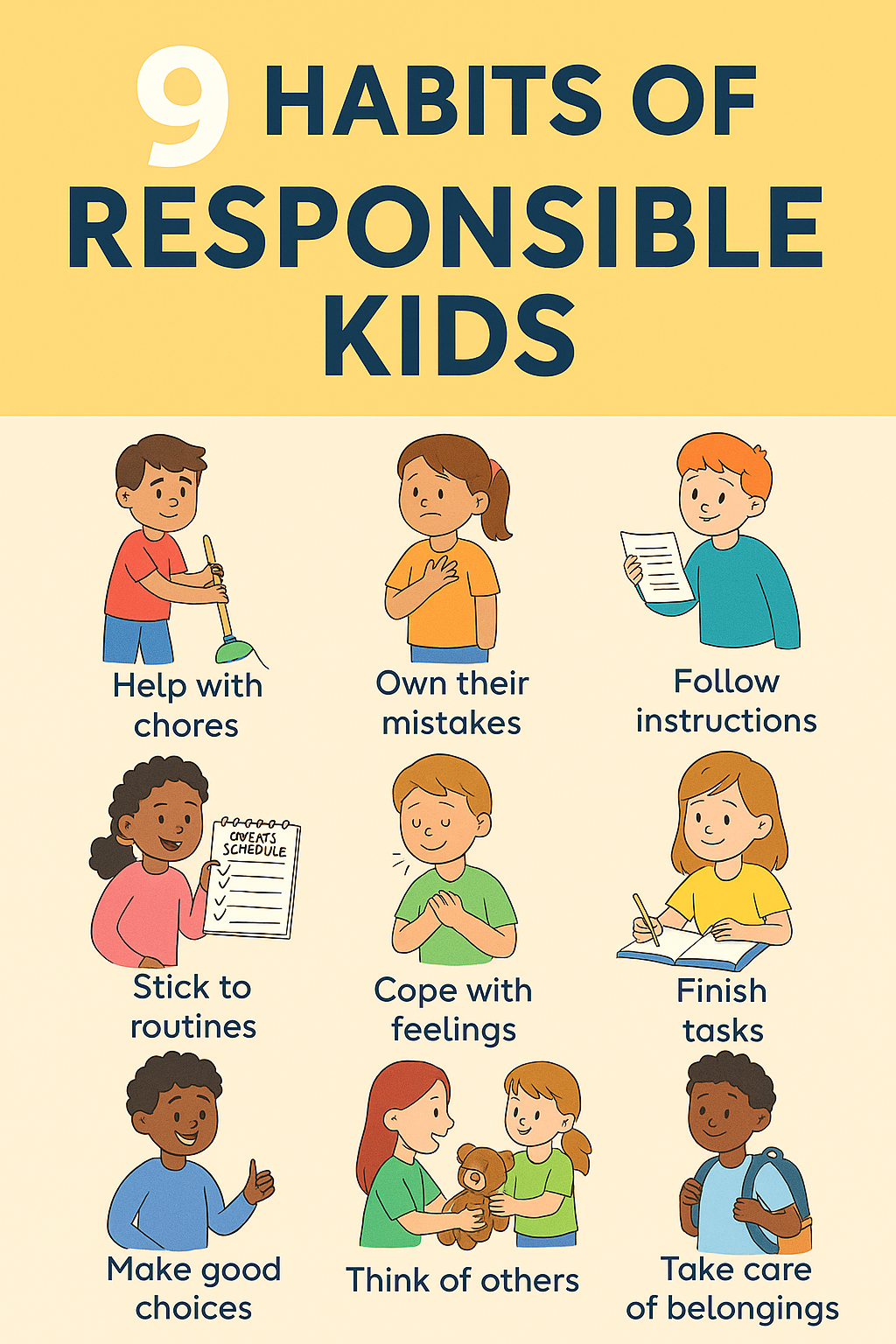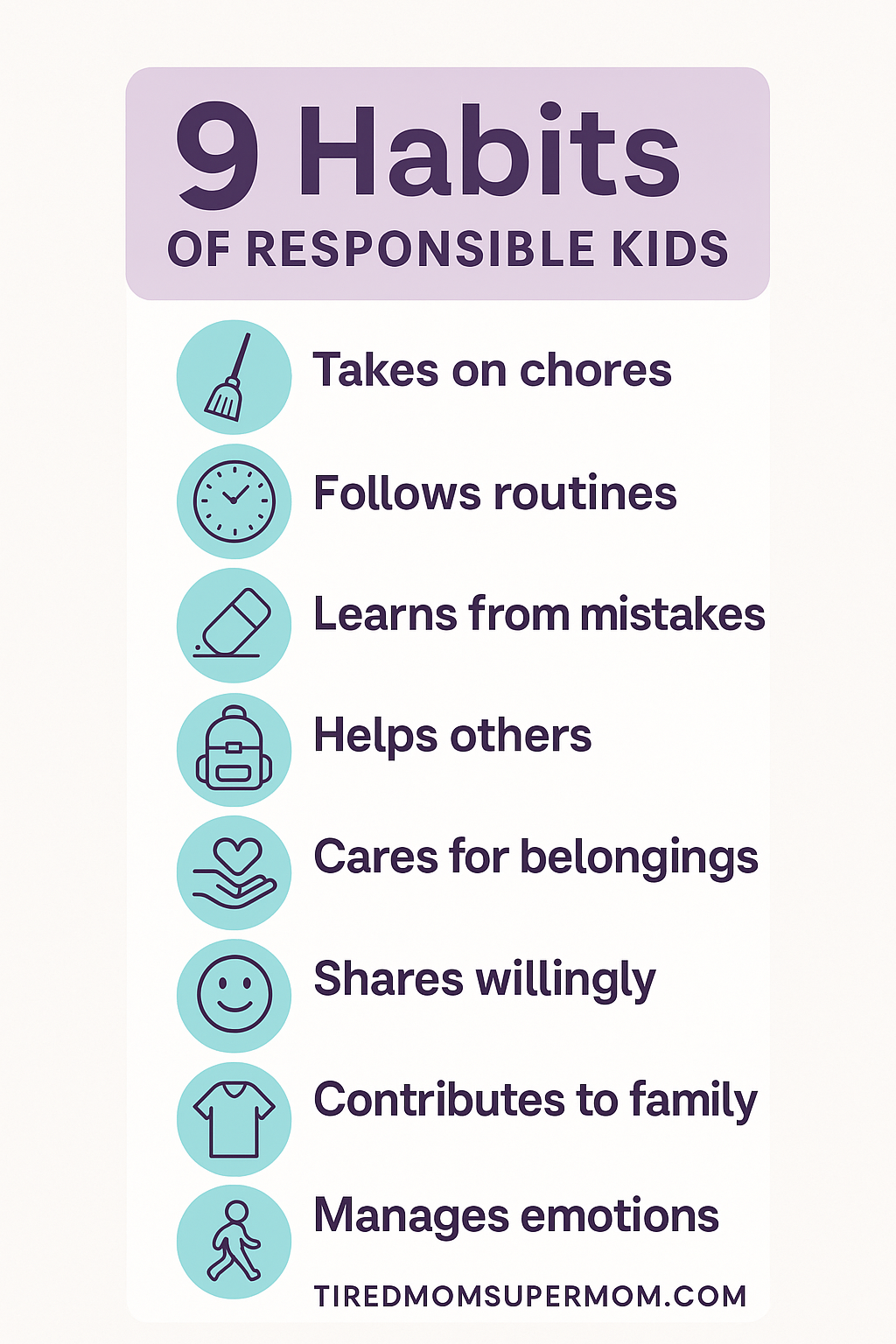How to Raise Responsible Kids: 9 Real-Life Habits That Actually Work
Raising responsible kids doesn’t happen overnight—but it is possible with a few intentional habits and a whole lot of consistency. If you’ve ever felt like you’re constantly reminding your child to do their chores, homework, or even just put their shoes away, you’re not alone.
The good news? There are practical, doable strategies to teach your child what responsibility looks like and help them take ownership of their actions—from toddlerhood to the teen years.
In this post, we’ll walk through how to raise responsible kids using age-appropriate tools, positive parenting techniques, and real-life examples you can try right away.
Heads up: This post may include affiliate links. As an Amazon Associate, I earn from qualifying purchases—at no extra cost to you. Full privacy policy and disclosure here.
What Does It Mean to Raise Responsible Kids?
Responsibility isn’t just about doing chores. It’s about:
- Being accountable for actions
- Following through on commitments
- Helping others without being asked
- Owning mistakes and learning from them
When kids learn to be responsible, they build self-confidence, problem-solving skills, and independence—skills that serve them for life.
Wondering how to raise responsible kids without constant reminders and nagging? These tools can help.
Why Responsibility Matters at Every Age
Whether it’s a toddler helping put toys away or a teen managing schoolwork and curfews, the concept of responsibility should evolve with your child.
Starting young lays the foundation for good habits. And it’s never too late to begin—your approach may shift, but the goal stays the same.
💡 Want age-specific tips? Check out this list of brilliant chore ideas by age to help kids feel capable—not overwhelmed.
If you’re not sure how to raise responsible kids in today’s fast-paced world, these small habits make a big difference.
Be a living example
Children often learn by observing the actions of their parents. To raise responsible kids, I believe it’s crucial for us as parents to not only talk the talk but also walk the walk. We need to be a living example of the behavior we want to see in our children. This means practicing what we preach and setting a positive example through our own actions.
When we display qualities like respect, kindness, and honesty in our daily lives, we create an environment that encourages our children to adopt these behaviors as well. They see us leading by example and understand the importance of being a role model for others.
“Actions speak louder than words. Children are incredibly perceptive and can quickly differentiate between what we say and what we do. By setting a good example through our own behavior, we show them the power of practicing what we preach.”
Being a living example goes beyond just telling our children what to do. It means embodying the values and principles we want them to embrace. When we show respect to others, our children learn the importance of treating everyone with kindness and consideration. When we demonstrate honesty and integrity, our children understand the value of truthfulness and trustworthiness.
By being a living example, we not only shape our children’s character and behavior but also instill in them the confidence and motivation to become responsible individuals who lead by example in their own lives.
The earlier you start learning how to raise responsible kids, the easier it becomes to build lifelong habits.
9 Practical Strategies: How to Raise Responsible Kids
Understanding how to raise responsible kids starts with giving them consistent opportunities to contribute at home.
1. Start with Small, Daily Responsibilities
One of the simplest ways to raise responsible kids is by giving them regular, small tasks they can handle. This could be as simple as making their bed, feeding the pet, or putting dirty clothes in the hamper.
Product pick: Try a responsibility chart like this Magnetic Responsibility Chart from Melissa & Doug to help younger kids visually track tasks.
🎯 Keep expectations age-appropriate and build from there.
2. Model the Behavior You Want to See
Kids learn more from what we do than what we say. If they see you owning your mistakes, following through, and taking care of your responsibilities, they’ll begin to mimic those habits.
Example: Say out loud, “I forgot to return that library book—I’ll take care of it now,” to show what responsibility looks like in action.
3. Give Kids Ownership of Tasks (Even If It’s Imperfect)
It can be hard to let go of control. But if your child loads the dishwasher their way or folds towels unevenly, let it go (unless it’s unsafe). That sense of ownership is how they build confidence.
Let them choose how to complete a task, and then check in rather than hover.
Avoid this trap → These 6 common mistakes when introducing chores might be holding your child back from success.
Many parents struggle with how to raise responsible kids while balancing empathy and structure—it is possible to do both.
4. Use Natural Consequences to Build Accountability
When your child forgets their homework or skips a responsibility, avoid rescuing them every time. Let them experience the natural result (like a lower grade or missing out on screen time) so they can learn cause and effect.
This is a powerful way to reinforce that responsibility = freedom.
5. Create a Routine with Visual Aids
Routine builds responsibility by removing the guesswork. Use visuals like checklists or schedules to help children stay on track without constant reminders.
Try this:
- Reusable daily checklist for younger kids
- Dry-erase weekly planner for tweens/teens to help with independence
📌 Bonus: These visual cues reduce nagging and increase cooperation.
When you know how to raise responsible kids, you empower them with skills they’ll use for a lifetime.
6. Teach Emotional Regulation Alongside Responsibility
You can’t expect a child to manage tasks if they can’t manage big emotions. Teach them how to calm down, express frustration appropriately, and ask for help when needed.
Resource: Navigating social media and emotional regulation in teens
Being responsible also means knowing how to respond when things go wrong.
7. Celebrate Progress—Not Just Perfection
Did your child remember to bring their backpack all week? Acknowledge it. Praise the effort, not just the outcome.
Say things like:
- “I noticed you fed the dog every day this week—great follow-through.”
- “You handled that mix-up with your friend really responsibly.”
Use affirmation cards for kids to help younger children internalize positive self-talk around responsibility and growth.
8. Use Books and Stories That Reinforce the Value of Responsibility
Children’s books are a great way to introduce and reinforce life skills. Look for stories where characters face choices, make mistakes, and take responsibility.
Recommended reads:
Reading these stories together can spark conversations about real-life situations.
This daily routine checklist is a helpful visual tool if you’re learning how to raise responsible kids at different ages.
9. Give Them a Chance to Contribute to the Family
Responsibility blooms when kids feel like valued members of the team. Give them meaningful ways to contribute—setting the table, helping a sibling, or sorting laundry.
Looking for ways to practice teamwork and generosity too? Check out these sharing activities for kids to encourage cooperation and empathy.
💬 Pro tip: Use phrases like “Our family takes care of each other” instead of “You have to do this.”
🟣 Grab Your Free Printable: Daily Responsibility Checklist for Kids!
Want an easy way to help your child stay on track with chores and daily tasks?
Download this kid-friendly responsibility checklist organized by age group—perfect for the fridge, your command center, or a dry-erase sleeve.
✅ Simple visual layout
✅ Covers ages 2 through 11+
✅ Encourages consistency and independence
FAQ: Raising Responsible Kids
How do I raise responsible kids without being too strict?
Focus on connection over control. Use positive discipline, clear expectations, and natural consequences rather than punishment. Show empathy while staying firm.
When should I start teaching responsibility?
Start as early as toddlerhood with simple tasks like putting toys away. The earlier you start, the more naturally it becomes part of daily life.
What if my child refuses to do their chores?
Stay calm and consistent. Use natural consequences, discuss the importance of contribution, and remove privileges if needed—but always follow through.
Can teens still learn responsibility if I didn’t start young?
Absolutely. It’s never too late. Start small, set clear expectations, and include them in decisions to help them build buy-in.
What tools help kids stay organized and responsible?
Try a family command center, visual charts, planners, or apps that let them track their own progress. Give them autonomy, and they’ll rise to the occasion.
Final Thoughts: Raising Kids Who Take Ownership
Raising responsible kids is a marathon, not a sprint. You don’t need to be perfect—you just need to be consistent, compassionate, and intentional.
Let your kids stumble. Let them recover. Let them see you doing the same.
And always remember: when kids feel trusted and capable, they become more responsible—at home, in school, and far beyond.
Pin for later!


